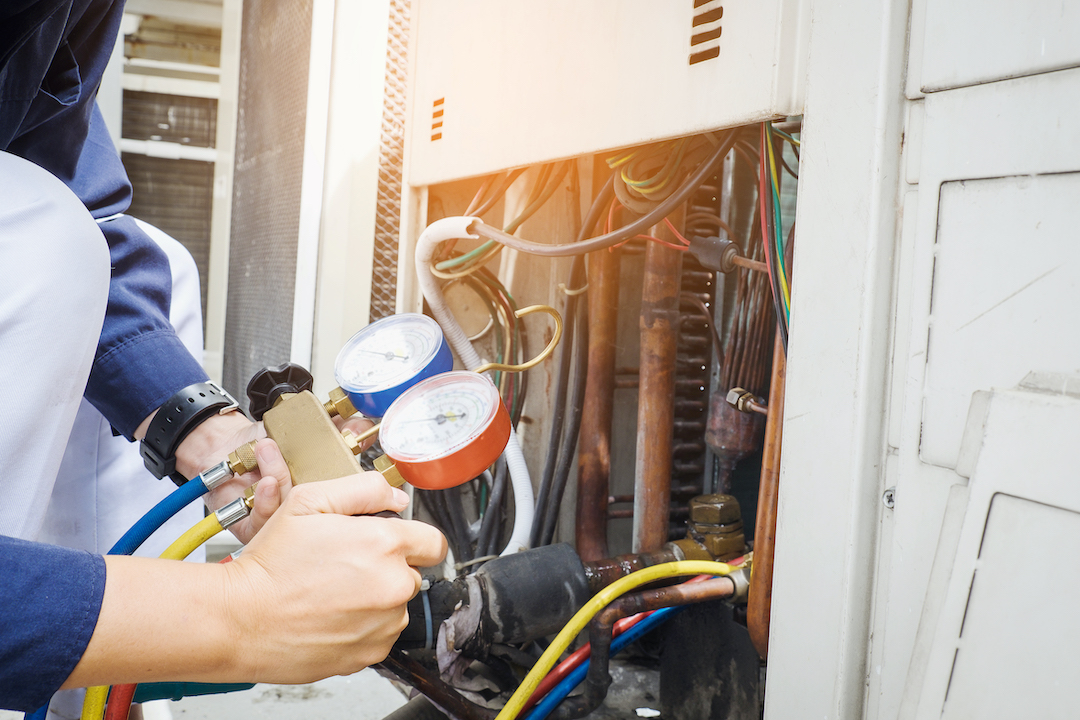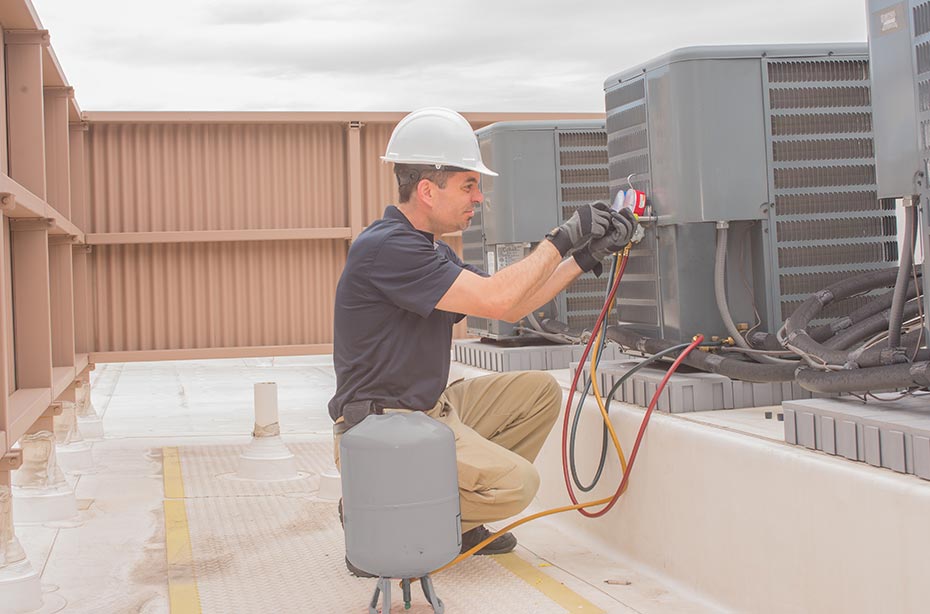Selecting In Between a Heat Pump and Heater: Secret Considerations for Your A/c Requirements
When reviewing heating alternatives for a/c requires, the choice between a heatpump and a furnace can be complicated. Each system provides distinctive benefits customized to details climates and power efficiency goals. Comprehending these distinctions is vital for making an informed choice. Key variables such as setup costs and ecological effect further make complex the selection procedure. Which option absolutely lines up with one's convenience and sustainability preferences? The following areas will certainly check out these factors to consider thoroughly.
Understanding Heat Pumps: Exactly How They Work and Their Advantages
While lots of house owners think about numerous home heating options, comprehending how warmth pumps function and their advantages can greatly affect their choice. Heatpump run by moving heat instead of creating it. In the winter season, they remove heat from the outside air or ground and move it inside, while in the summer, they reverse this procedure, cooling down the home by removing warm outside. This dual functionality makes them flexible for year-round environment control.One of the key benefits of heatpump is their power performance. They use significantly much less electricity compared to conventional home heating systems, possibly causing reduced utility bills (heat pump replacement ooltewah tn). In addition, heatpump have a smaller carbon footprint, making them an environmentally friendly selection. They additionally need less maintenance than standard systems, contributing to lasting price financial savings. On the whole, understanding the mechanics and advantages of heatpump can help property owners make educated choices regarding their heating and cooling demands
Checking Out Furnaces: Types, Operation, and Advantages
Heaters are available in numerous types, including gas, electric, and oil designs, each with unique operational mechanisms. Recognizing these distinctions is essential, as they impact performance and home heating efficiency. Additionally, heating systems use various benefits, such as constant warm outcome and reliability in cooler environments.
Types of Heaters
Home heating systems can vary considerably in layout and operation, with furnaces being a prominent choice amongst house owners. There are numerous kinds of furnaces, each utilizing various gas sources and technologies. Gas heating systems prevail, leveraging gas to create warm efficiently. Electric heaters, on the various other hand, use electrical resistance to generate heat, usually preferred for their straightforward installation. Oil heating systems, while less typical, are effective in locations with limited gas access (heat pump service). Furthermore, condensing furnaces make the most of power effectiveness by catching and recycling exhaust gases. Each type runs via a system of warm exchangers and ductwork to disperse cozy air throughout a home. Understanding the distinctions between these heater kinds is necessary for educated heating and cooling choices
Benefits of Heating systems
For home owners seeking trusted warmth during chilly months, the advantages of heaters are significant. Heating systems offer constant home heating, making certain even temperature levels throughout the home. They are especially effective in severe cool, typically outmatching warm pumps in icy problems. Numerous kinds, consisting of gas, electrical, and oil heaters, offer flexibility to satisfy diverse needs and preferences.Furnaces also have a tendency to have lower initial installation costs contrasted to heatpump, making them an extra accessible choice for several. Their durable layout contributes to a much longer lifespan, with numerous devices lasting over 15 years with appropriate upkeep. Furthermore, contemporary furnaces are typically equipped with innovative modern technology for boosted performance, which can bring about minimized energy costs. In general, furnaces remain a reliable selection for efficient home heating.

Power Effectiveness: Contrasting Heat Pumps and Furnaces
When contrasting power efficiency in between warmth pumps and heating systems, the Seasonal Power Performance Ratio (SEER) plays a crucial role in establishing performance. Furthermore, a functional cost analysis discloses the long-term economic effects of each system. Recognizing these aspects can assist home owners in making educated decisions concerning their heating options.
Seasonal Power Performance Proportion
Power efficiency plays an important function in the decision-making procedure between heatpump and heaters, specifically when considering the Seasonal Energy Efficiency Ratio (SEER) This metric steps the cooling effectiveness of heatpump over an entire air conditioning period, giving a standardized method to examine performance. Higher SEER ratings indicate greater power performance, converting to reduced energy consumption and reduced energy costs. In comparison, heaters are generally evaluated using the Yearly Gas Use Effectiveness (AFUE) score, which mirrors heating effectiveness. When contrasting these two systems, home owners ought to focus on SEER ratings for warmth pumps, as they straight impact overall power cost savings and environmental sustainability. A comprehensive understanding of SEER can notably affect the lasting fulfillment and cost-effectiveness of the selected HVAC solution.
Operational Cost Evaluation
Comprehending the operational prices connected with heatpump and heating systems is vital for house owners evaluating their alternatives. Warm pumps usually offer greater energy effectiveness, converting electrical energy right into heat with very little waste. This results in reduced monthly energy bills, particularly in modest climates. Alternatively, conventional heaters, especially gas versions, may have reduced upfront prices but can sustain greater functional costs her explanation gradually because of sustain costs and effectiveness ratings.Moreover, heatpump can work as both home heating and cooling down systems, potentially minimizing the demand for separate cooling and heating units. While preliminary financial investments for heatpump may be greater, their lasting savings in energy effectiveness can make them an extra affordable choice for several homes. Cautious evaluation of neighborhood energy rates is vital to determine the finest alternative.
Installment Costs: What to Expect for every Home Heating System
Setup expenses for furnace can differ considerably in between heatpump and furnaces, affecting homeowners' choices. Heatpump typically have higher ahead of time that site setup costs, commonly ranging from $3,500 to $8,000, depending on the device size and intricacy of installation. This consists of the exterior unit, interior handling system, and necessary ductwork alterations. Conversely, furnaces tend to have lower preliminary prices, balancing in between $2,500 and $6,000, which can be appealing for budget-conscious house owners. Nevertheless, setup expenses can increase if extensive ductwork is required.Moreover, the choice of gas kind for heating systems-- gas, propane, or electrical-- can additionally influence setup costs. While heat pumps offer power effectiveness, their initial financial investment might hinder some customers. Inevitably, evaluating installation costs alongside lasting savings and performance will assist house owners in making notified decisions regarding their furnace.
Environment Considerations: Which System Does Better in Your Location
How do environment problems influence the performance of heating unit? The performance of warm pumps and furnaces can differ considerably depending upon the neighborhood climate. In modest environments, heatpump stand out by successfully transferring warm from the outdoors air, making them an energy-saving option. Nonetheless, their efficiency reduces in extremely chilly temperature levels, where they may have a hard time to remove sufficient warm. Alternatively, heating systems, specifically gas versions, offer consistent and reputable warmth despite outdoor problems, making them preferable in cooler regions.In locations that experience milder wintertimes, heatpump can operate efficiently year-round, providing both heating & cooling. On the other hand, areas with severe winters commonly take advantage of the toughness of heaters. Ultimately, understanding the regional climate is essential when making a decision in between a heatpump and a heater, as it directly influences their operational performance and general performance.
Maintenance Requirements: Long-Term Look After Warmth Pumps vs. Furnaces
While both warmth pumps and furnaces require normal maintenance learn the facts here now to guarantee peak performance, their specific needs and treatment routines vary significantly. Heating systems usually need less frequent interest, with yearly examinations being sufficient to look for gas leaks, tidy filters, and analyze overall performance. Their simpler style often permits simple repairs.In contrast, heatpump demand semiannual maintenance due to their dual role in heating and cooling. This includes cleansing coils, examining cooling agent degrees, and making certain that both the indoor and exterior systems function at their best. Additionally, heatpump maintenance frequently includes more detailed parts, making specialist servicing essential.Neglecting upkeep can result in decreased effectiveness and boosted energy costs for both systems. Ultimately, home owners ought to take into consideration these long-term care requirements when picking between a heat pump and a heater, as positive maintenance can expand the life expectancy and efficiency of either system considerably.
Ecological Effect: Selecting a Lasting Heating Alternative
The ecological effect of furnace is an important examination for home owners seeking lasting choices. Warmth pumps are typically a lot more energy-efficient than typical furnaces, as they transfer warmth as opposed to generate it, significantly lowering carbon discharges. By utilizing eco-friendly power sources, such as geothermal or air-source heatpump, homeowners can further reduce their environmental footprint.On the various other hand, gas heaters produce greenhouse gases and contribute to air pollution, though they commonly supply higher warmth output. Improvements in modern technology have actually led to the advancement of high-efficiency furnaces that reduce emissions.Ultimately, picking a heating system involves weighing efficiency versus ecological influence. Property owners are encouraged to assess regional energy resources and rewards for eco-friendly systems, making sure a choice that aligns with both individual convenience and ecological responsibility. The choice influences not just instant convenience however additionally long-term sustainability and environmental wellness.
Frequently Asked Inquiries
Just How Lengthy Do Warmth Pumps and Furnaces Usually Last?
The life-span of heatpump typically varies from 15 to 20 years, while furnaces can last in between 15 to three decades. Normal upkeep significantly impacts their longevity and effectiveness in offering heating services.
Can I Use a Heatpump in Incredibly Cold Climates?
Heatpump can run in very chilly climates, however their performance reduces as temperatures decline. In such problems, extra home heating resources might be required to preserve comfortable indoor temperature levels and guarantee peak efficiency.

What Is the Sound Level of Warm Pumps Versus Furnaces?
The noise levels of warmth pumps and heaters differ considerably. Normally, heatpump run even more silently than typical heaters, making them preferable for those delicate to sound, while furnaces might produce louder operational sounds during home heating cycles.
Are Warmth Pumps Suitable for Both Cooling And Heating?
Warmth pumps are indeed ideal for both heating & cooling (furnace replacement). They function by transferring heat, providing reliable temperature level control year-round, making them a functional selection for property owners looking for an all-in-one a/c service
What Dimension Heating System Do I Need for My Home?
Figuring out the ideal size heater for a home requires evaluating aspects such as square footage, insulation top quality, local environment, and the home's format. Consulting an expert can assure an exact analysis and ideal comfort. Warmth pumps generally offer higher energy efficiency, converting electrical energy right into warm with minimal waste. In modest environments, warm pumps stand out by effectively moving warmth from the outdoors air, making them an energy-saving option. Conversely, furnaces, particularly gas versions, offer reliable and constant heat regardless of outdoor problems, making them preferable in chillier regions.In locations that experience milder winter seasons, heat pumps can run efficiently year-round, supplying both heating and cooling. Heat pumps are generally extra energy-efficient than traditional heaters, as they move warm instead than create it, considerably minimizing carbon exhausts. By making use of sustainable power resources, such as geothermal or air-source warm pumps, property owners can better lessen their ecological footprint.On the other hand, all-natural gas heaters discharge greenhouse gases and contribute to air pollution, though they frequently provide greater warm output.